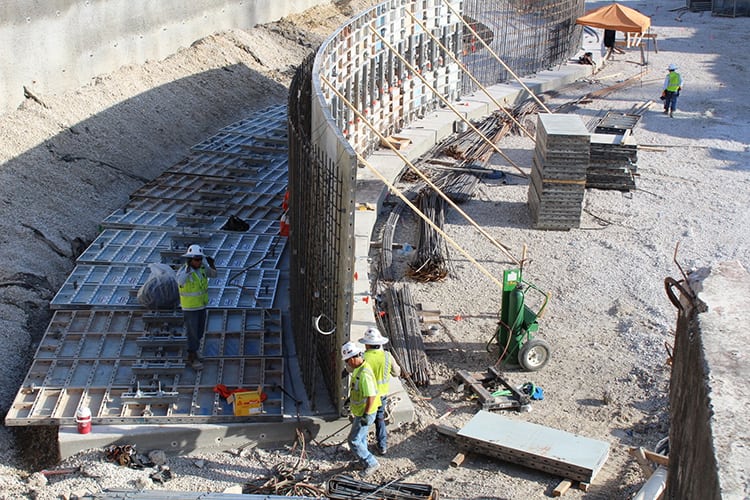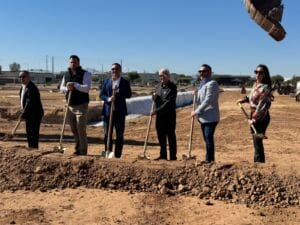Glance around the Phoenix market and you see construction is booming.
Big projects are underway in all parts of the Valley as the current building boom rolls on. While it seems there is nothing holding back this flow of commercial construction projects, there is one factor that could dam up the river.
“According to research that NCCER (the National Center for Construction Education & Research) did, the projection is that by 2020, we’ll be 2 million people short in construction professionals,” said Dan Haag, senior vice president and chief administrative officer for Sundt Construction. “Can we fill those openings with current population? Probably not. We need an influx of people. But we also need to improve the education programs for folks to go into.”
While organizations like the Arizona Builders Alliance have outstanding training and certification programs in place, individual companies have been pushed to develop training programs of their own to make sure they can keep up. Companies are investing in in-house training and education programs for their workforce so they can be more efficient and deliver better results with a smaller number of professionals in the field.
In Arizona, one of the more unique training program is operated by Sundt Construction. Sundt’s Center for Craft Excellence (CCE) is bursting at the seams with craft professionals being trained in the core skills that Sundt needs on projects that it self-performs, areas like pipefitting, welding, construction carpentry, pipe welding, concrete and structural work.
The CCE is located at Sundt’s former Arizona headquarters in south Phoenix. The concept was developed in 2013 when Sundt’s executives could see that the craft workforce was aging and the economy was rebounding.
“We believed we needed to do this since there was a severe lack of commercial craft professional programs in the State of Arizona,” said Haag. “We needed to create our own future to be successful.”
All new employees at Sundt come through the CCE for safety training and orientation. Those employees interested in advancing or getting certification can take classes at the CCE, which are offered at times that allow participants to work while going through training.
“It’s hard to pull craft employees off the job to do training, so we’re focusing on high-potential employees,” Haag said. “Starting in July, we’ll offer classes at night. Participants will take one week of carpentry, one week of pipe fitting, one week of welding. In the welding classes, we had 14 or 15 signed up and we hadn’t even advertised it.
“The opportunities and interest are there, but you’ve got to be flexible. You can’t say we’re only going to do training Monday through Friday from 7 to 4 o’clock, because you’re going to lose the majority of them.”
Workers who come through the CCE get the training and education that allows them to get certified, something that means a higher paycheck and quicker advancement. The center has classrooms and computer labs for instruction and testing, but the majority of the training goes on outside, either at the CCE or on a job site.
“I don’t want someone to sit in a booth, all day, welding. I don’t want training to be just theory based,” said Sean Ray, Sundt’s director of craft workforce development. “Anything that we have them doing, we try to make it like the things they will see in the field, so there’s not a shock and awe when they get into the field and say, ‘I didn’t know it would be anything like this.’”

At the CCE, Sundt has five full-time employees and the company has 22 certified trainers who offer instruction in the field and at the center. One of Sundt’s most valuable instructors is Josue Ponce, who is a welding subject matter expert and industrial instructor.
Ponce is a certified quality manager and trains all of Sundt’s welders at the center on the procedures that they use. If it’s being welded by a Sundt craftsman, Ponce instructed that person on how to do that weld.
Arizona is a state that does not require a journeyman license for many construction skills, like pipe fitting, but Sundt trains its workers through the CCE so they become certified journeyman pipe fitters or iron workers or welders.
“Now we can say, this person is NCCER Certified or Certified Plus,” said Ray. “Workers get $2.50 an hour more for being Certified Plus.”
Haag said Sundt started 2017 with zero craft professionals with the Certified Plus designation, but through the CCE training, ended the year with 96. In 2018, the goal was 100 Certified Plus craftsmen and Sundt was well on its way to that goal with 59 by May.

“We should end up with 200 Certified Plus professionals by the end of the year,” Haag said. “It’s about productivity, quality and safety, not necessarily in that order. And we have people who know what they are doing and we have confidence in our core craft professionals in the field.”
Haag said the CCE’s current facility will soon give way to a new one, as Sundt is in the initial planning stages for a new Center for Craft Excellence, one with more indoor work space so training can go on during the hot summer months.
“We repurposed the building and now it’s full of people running the workforce development programs and the building is serving its purpose for the moment, but we’re growing out of it,” Haag said. “This will probably be all knocked down and in the next year or two, we’re going to build a brand new Center for Craft Excellence.”
Another Sundt workforce development initiative has been helping Central Arizona College build its Industrial Construction Program from the ground up. In the summer of 2017, Haag, Ray and other Sundt executives met with Central Arizona College to propose a simple apprenticeship program for heavy equipment operators. After the initial meeting with CAC president Jackie Elliott went well, Haag decided he would see just how much he could pile into the program.
“On their drive back to Mesa, they must have said, ‘hey, that president, she says yes to anything, so let’s go back and ask for something else,'” Elliott said. “So they came back and Dan so subtly slipped in and said, ‘have you ever thought about maybe we could do concrete forming and pipefitting and pipe welding and industrial construction,’ and I said, ‘sure, we could do that.’”
While Elliott may have been enthusiastic about the program, CAC didn’t have the budget to fund it, so Sundt stepped in and provided tools and equipment as well as instructors. The program is unique because it includes teaching soft skills like timeliness and other basic functions of an effective employee. It’s also Occupational Safety and Health Administration (OSHA) embedded and offers stackable credentialing programs.
“We co-designed the program to deliver the skills that companies want,” Elliott said. “We call it education at the speed of industry.”
The first year program had more than 100 participants, with 30 graduates. Of those 30, all were immediately hired.
“We have a hard time keeping our students in the welding program because they are in such high demand,” Elliott said. “Companies are lining up to hire them.”
Ray said two of the students in the welding program were hired by Brycon Construction in Chandler, Journeyman welder pay at 20 and 21 years old.
“We’re in it to help the industry,” Haag said of the CAC program, one he’s working to expand to other colleges in Arizona and Texas. “We’re competing with all of the companies to hire these graduates. This is what we need in order to grow the talent for our future.”
While the Sundt programs are unique for Arizona, it is not the only company working hard to fill the craft profession with a well-trained workforce. Here are what two other companies are doing:
McCarthy Building Companies
According to Justin Dent, vice president of operations for McCarthy Building Companies Southwest Region, his company focuses on three primary areas when it comes to its workforce development programs: Development of a Future Workforce, Recruiting and Training New Employees and Training and Retention of Employees.
McCarthy’s Development of a Future Workforce initiative focuses on engaging youth and high school students and their parents to highlight how rewarding a career in construction can be and that young people have options to college.

These efforts include:
– Skills USA – McCarthy is a teamwork competition host of this national program for high school, college and middle-school students, which through competition, prepares our future workforce.
– STEM hands-on construction curriculum developed by McCarthy for elementary and middle-school students, where they see first-hand how to apply STEM lessons in building.
– Construction Career Days sponsor of this annual event where students from across the state participate in an interactive event that introduces students to careers in construction.
– JTED program recruitment and teaching where McCarthy employees support recruitment efforts and serve as guest instructors at Metro Tech, WestMEC, etc.
– McCarthy attends more than 50 community outreach events nationally, focused on educating parents, students and faculty about construction careers.
The Recruiting and Training New Employees efforts provide training and employment opportunities to individuals who have an interest in pursuing a career in construction. McCarthy engages interested individuals in entering construction, trains them on projects and hires qualified candidates to join the firm.
– Apprentice programs with JTED and Community Colleges where students receive internships at McCarthy and are invited to participate in its apprentice program. This summer alone, McCarthy is hosting at least a dozen craft worker interns on projects.
– Training Within Industry (TWI) is a national program whereby people with no experience in construction receive training necessary to begin a career in solar construction. Many of McCarthy’s recruits through this program live in rural communities and work in fast-food, retail or other low-earning jobs. TWI is a training program that introduces non-construction industries to entry-level field work in construction where new skills are acquired in a growing industry, and provides workers with the ability to transition into a full-time employee at McCarthy.
-Greater Phoenix Chamber of Commerce Foundation workforce recruitment program is marketing to potential candidates, sharing opportunities for careers in construction at McCarthy, as well as other firms.
McCarthy invests significantly in the professional development of its employees through its Training and Retention of Employees program. This training program is available to employees at all levels, and provides a road map for long-term success.
– McCarthy is a Top Training Firm, and has been recognized nationally for many years as one of the top training firms in the country. Last year, McCarthy was inducted into Training Magazine’s Hall of Fame.
– Craft Certifications: McCarthy invests in the training of craft labor, including forklift, scissor lift and boom lift training as well as safety training in fall protection, use of power tools, saws and blue print reading.
– Women in Construction conference sponsors, where McCarthy women engage in various conferences throughout the year and across the nation to highlight their expertise and promotes mentorship.
DP Electric
Just in its third year, DP University is delivering measurable results for Tempe-based DP Electric, an independent electrical subcontractor.
“Back before the recession, we did $32 million in work with an average of 265 staff electricians,” DP Electric owner and founder Dan Puente said. “Now, we’re doing $68 million with 300. We’re just so much more efficient. That was an upside to the recession, it forced you to refine processes and look at everything to be more efficient.”
DP University is a data-driven program that ties job performance with training. Performance reviews are tied to job descriptions which are tied to the employee development program. Recruiting and talent management director Steven Brown is DP’s numbers guy. He takes the performance reviews from the foremen in the field and crunches the numbers to come up with what classes need to be offered.
“The foremen, the ones working with these young men and women everyday, they are basically grading them on how well they perform the tasks for their job,” said Scot Rager, DP Electric’s education manager. “So then Steve uses that data.”
“Once we figure out what those areas of opportunity are, that’s where Scot comes in,” said Brown. “He has the knowledge when it comes to the electrical skills, the education needed, so he’s on the curriculum development side.”
Once areas of opportunity are pinpointed, DP will offer classes to help its employees improve their knowledge and skills in those areas. Puente said employee involvement is extremely high, with veterans willingly coming in on Saturday’s to train the up-and-coming electricians in the company. Many classes fill up and second and third classes have to be added.
Puente said the company is also in the planning phase for a scholarship program for high school students interested in the industry. The idea is to go out to the schools to find interested high school students and bring them in and educate and train them, both in a classroom setting and in the field.
“We want to see if they’re interested, if they’re mechanically inclined and if they can cut the mustard,” Puente said. “We want to put them out on a job site, at noon in the middle of summer, and see if they don’t run away.”
Those who show the desire to work in the industry will then have an opportunity to train in the ABA apprenticeship program. Puente said the company will pay for the apprenticeship program as well as pay them to work. So after getting paid to work and having the cost of the ABA apprenticeship program covered, they can become a journeyman electrician at no cost.
“We’re trying to piggy-back off of what we’re doing internally and trying to expose what we do to the youth and get them engaged with the industry,” said Puente, who hopes the DP program can grow to 30 or 40 participants in two years. “We’re just going to do something to feed our pipeline.”




